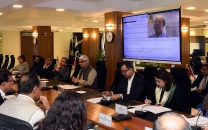PECA Ord 2022 promulgated in ‘violation’ of Constitution
IHC CJ asks why public office-holders are worried about social media

The Islamabad High Court on Friday noted that an ordinance amending the Prevention of Electronic Crimes Act (PECA) was promulgated in violation of the Constitution’s Article 89, given that a session of the National Assembly had already been convened.
The court, led by IHC Chief Justice Athar Minallah, clubbed the petitions filed by media bodies, political leaders, and journalists against the PECA ordinance 2022.
The IHC chief justice raised the questioned as to why the government had promulgated the ordinance with such urgency.
“The implementation of the ordinance is stalled. Why shouldn’t we declare it null and void?” he asked.
He observed that senior lawyer Munir A Malik had raised a very important point -- on the day the ordinance was promulgated, a meeting of the lower house was also convened.
To this, the assistant attorney general (AAG) replied that it was not enough for the president to tweet about the convening of the session. “Rather, it is necessary to see what is on the session’s agenda,” he added.
Attorney General for Pakistan (AGP) Khalid Javed Khan could not appear before the court because of his busy schedule.
Justice Minallah also sought arguments on the amendment in Section 20 of the law whereby defamation had been made a crime carrying a penalty of up to five years in prison.
He added that it was being misused to end political debates.
He pointed out that Pakistan was a signatory to international treaties on civil rights, but the government was going against them. He remarked that it was important to look at international standards, and the country could not be taken backwards in time.
The judge also asked the government why public office-holders were worried about social media when the standards for them were different than those for the general public.
Read More: AEMEND rejects PECA tweak
The chief justice also questioned the practice of self-censorship in a democracy, pointing out that the Federal Investigation Agency’s (FIA) report had revealed that journalists were being monitored over the internet.
“You [the government] have given the FIA the authority to make direct arrests in defamation cases,” he remarked.
The AAG told the court that through the ordinance, the world “natural” was removed from the Section 20 to include institutions as the reputation of some institutions had to be protected. He added that as the judges could not lodge a complaint, the amendment had enabled the registrar to file one.
At this, Justice Minallah remarked that the government should not worry about the judiciary as judges were not afraid, and their reputation was built on their conduct and decisions.
He added that public trust in the institution was essential. “Every institution is accountable to the people.”
The AAG replied that there was no objection to “positive” criticism.
The chief justice asked as to who would decide whether the criticism was positive or negative. “Nobody should be afraid of criticism.”
Lawyer Malik said that the solution to fake news was to spread the truth as much as possible.
The chief justice asked who was threatened by social media. “Why blame social media? If the values of the society are bad, should the Constitution be abolished?” he questioned.
“The president issued the ordinance by apparently ignoring parliament.”
The court then sought arguments from the AGP during the next hearing and adjourned the case till March 30.



















COMMENTS
Comments are moderated and generally will be posted if they are on-topic and not abusive.
For more information, please see our Comments FAQ